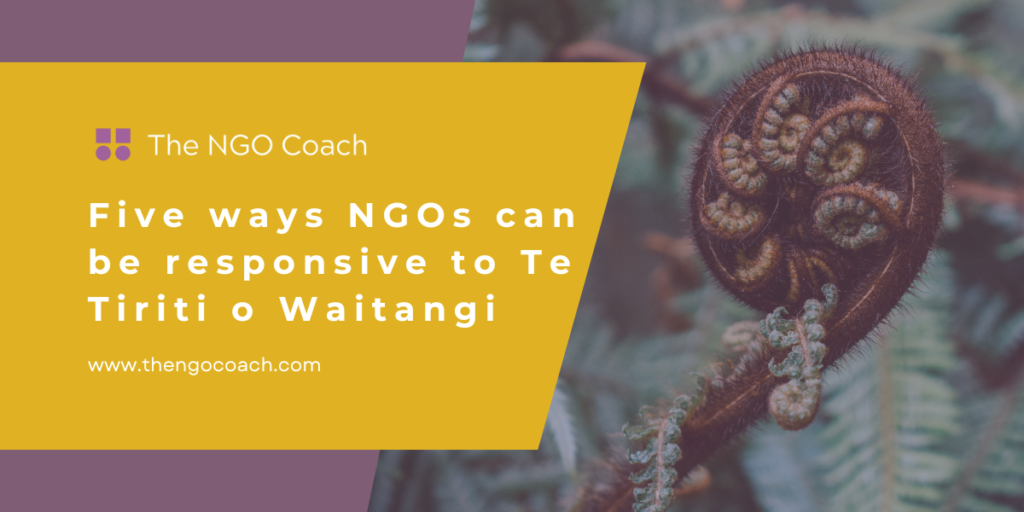Leading an NGO, charity, or community group can be challenging, right? It feels like juggling multiple tasks while walking on a tightrope. But amidst the madness, it’s important to pause and think about the bigger picture – like how your organisation is honouring and responding to Te Tiriti o Waitangi in its mahi.
When it comes to putting strategy into action, things can get complicated. There’s no playbook for practically implementing responsiveness to Te Tiriti o Waitangi at an operational level. And it can swing between scary, frustrating, confusing, exhilarating, and enriching.
Let me share five ways your NGO can get started being responsive to Te Tiriti o Waitangi. These are all practical steps I’ve implemented at both a personal and organisational level over the past few years:
1. Recognise that Becoming Responsive to Te Tiriti o Waitangi is a Journey
This isn’t a quick fix. If you’re serious about this, it will take a lot of time. You’ll need to make space for reflection, invest extra time and resources, and be ready to roll up your sleeves for some hard mahi. Everyone in your team will be on their path in this journey, learning and growing at their own pace. There’s no one-size-fits-all solution here. You can learn from other community groups and leaders and have a kōrero with them about their journey, but what worked for them won’t necessarily work for you. You’ve got to be flexible and okay with the uncertainty. And most importantly, you’ve got to be in it for the long haul.
2. Start with Yourselves as Individuals and as a Collective
The journey begins with you. It’s both a personal and organisational journey. There are plenty of resources out there to help you get started (I’ve listed some at the end). As individuals, take the time to learn about your own whakapapa. Where were you born? Where were your parents born? Where did you grow up? Where do you live now? Where is your office located? What’s the history of all these places that have shaped your life? You might be surprised by what you discover. Be ready to share your story, the good and the not-so-good. Be open to how it may have impacted those around you. Own your journey.
3. Create Space for Tough and Challenging Conversations at a Personal and Organisational Level
Commit one hour at least every two weeks for deep, meaningful conversations amongst your kaimahi / staff. Don’t be afraid to challenge or learn from each other. Welcome different perspectives, lived experiences, and personal struggles. For that, you need to create a safe space.
Start with resourcing from the Treaty Resource Centre – He Puna Mātauranga o Te Tiriti to guide the kōrero. These questions will get you thinking about how your organisation came to be, where you’re at now, where you want to go, who you represent, and whether they saw themselves reflected in what you provide through your services, website, social media, publications, your use of language. As you grow, discussions will evolve, and remain open to that. Some kaimahi may want more structure, measurable changes, evidence of real progress, and a clear pathway forward so be ready to adapt.
4. As You Make Discoveries, Start Implementing Small Changes
Don’t underestimate the power of starting small. Boards often love big, shiny changes that look good on paper and in annual reports. But that’s not how real change happens. It’s gradual, and it requires hearts and minds to shift. Small and medium NGOs often don’t have the budget for big moves (hey, even the big NGOs often don’t!).
It can be tempting to hire a Māori consultant to kick things off, but chances are, your kaimahi won’t be ready to make the most of that investment. As Pākehā, it’s up to us to learn about Te Tiriti o Waitangi, to do the mahi, the thinking, the research, the learning. You can start by making small changes to your external communications – your website, social media, publications, presentations, design, and so on.
5. Be Courageous and Open to Correction
Stepping into new territory can be scary. It feels risky and uncertain. But sit with that discomfort and take courage in the journey your organisation and kaimahi are on. Don’t second-guess the changes you’re making, but be ready to be corrected and open to that. You won’t always get it right. Sure, you’ll probably stumble and say the wrong thing. But own up to your mistakes, apologise if needed, and make a correction. And get ready for some pushback (there will always be a few who aren’t happy with what you’re doing). Don’t let the naysayers sway you from your path. Just keep rolling with it.
So, there you have it—a sneak peek into how to start responding to Te Tiriti o Waitangi. It’s a journey of self-discovery, growth, and evolution. It won’t be easy, but it will be worth it.
Keen to get started embedding Te Tiriti o Waitangi in your organisation?
· Check out Jen Margaret’s webinar – Treaty Voyages: How’s Your Organisation Faring?
· Visit Groundwork for helpful resources supporting organisations and individuals to embed Te Tiriti honouring in daily action. They include books, podcasts, webinars and activities specifically targetted to community groups.

